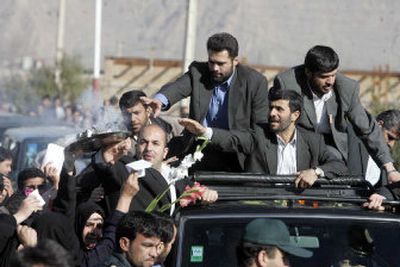Iran hints at oil threat to counter sanctions

VIENNA, Austria – With the stage now set for a high stakes U.N. Security Council debate next week on possible sanctions for Iran’s nuclear program, Tehran on Wednesday warned the United States that it too can inflict “harm and pain” and hinted its weapon could be oil.
The sharp statement, which followed a warning this week by Vice President Dick Cheney that Iran could face “meaningful consequences,” came on a day when the U.N. nuclear watchdog agency concluded a series of meetings on Iran and forwarded its report to the Security Council.
The report by the International Atomic Energy Agency’s director general Mohamed ElBaradei found that after nearly three years of inspections, the nuclear agency remains unable to rule out the possibility that Iran still has secret nuclear activities, which could include work related to uranium enrichment and efforts to adapt weapons to carry a nuclear bomb.
The IAEA board of governors last month reported Iran to the Security Council pending ElBaradei’s report. The IAEA demanded, among other things, that Tehran cease all nuclear enrichment activities, answer all outstanding questions about its nuclear program and ratify a protocol that allows more wide-ranging inspections. But Iran ignored the demands.
Economic actions are unlikely in the near-term from the Security Council. And on Wednesday, the foreign minister of Russia, which has veto power, disparaged their use as a diplomatic tool. Yet the referral of Iran’s case to New York opens a new chapter, one that Iran has sought to avoid.
Iranian officials have warned repeatedly that they may feel forced to respond aggressively if the Security Council takes action against them, but their strongest words were reserved for the United States.
A.H. Soltanieh, Iran’s ambassador to the International Atomic Energy Agency, told the gathered ambassadors in Vienna on Wednesday: “The United States has the power to cause harm and pain, but the United States is also susceptible to harm and pain. So if that is the path that the U.S. wishes to choose, let the ball roll out.”
When asked if Iran, the world’s fourth largest oil supplier, would use its oil exports as a weapon to punish the West, Javad Vaeedi, deputy head of Iran’s National Security Council, said: “We will not do so now, but if the situation changes we will have to review our oil policies.”
Meanwhile, Undersecretary of State Nicholas Burns, testifying before Congress, said Iran “directly threatens vital American interests” and Washington planned “a concerted approach (in the council) … that gradually escalates pressure on Iran.”
At the same hearing, Robert G. Joseph, undersecretary of State for arms control and international security, said that a nuclear-armed Iraq is “intolerable.” Asked whether the administration was prepared to launch a military effort, Joseph replied that President Bush “has made clear that there are no options off the table.”